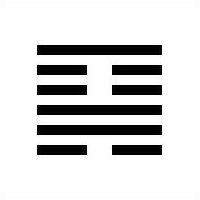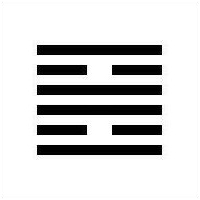In addition to its use as an oracle, the Book of Changes also serves to further intuitive understanding of conditions in the world, penetration to the uttermost depths of nature and spirit. The hexagrams give complete images of conditions and relationships existing in the world
– Wilhelm
First, extend your vision, second, widen your information, third, stabilise your clarity of mind
– Thomas Cleary, Thunder in the Sky
The I Ching was originally an oracle system not philosophy. A Taoist scholar called Wang Bi changed the emphasis then Confucius, Carl Jung, and Chung-Ying Cheng developed this further. Jung called the book “psychological phenomenology” which is a fine description. Philosophy Professor Chung-Ying Cheng examined the book historically, and identified six stages of development:
- Comprehensive Observation and Natural Cosmology
- Relating Present to Future and Making Divination
- Formation of the Trigrams and Hexagrams on the Basis of Number Theory
- Reflection on Human Life and Discovering the Human Situation
- Exploring Meaning of Change and Human Virtue through Confucius
- Deepening Insight into the Onto-Cosmological in Philosophy of the Dao (Chung-Ying Cheng, The Primary Way)
The I Ching has advanced from what it originally was, not removed from the origin, but expanded and explained with higher layers. Someone of three thousand years ago did not have the sophistication of an average person today. Notable for this development, conceptually and historically, are the Confucian Ten Wings, and Carl Jung’s foreword to Wilhelm’s translation.
There is a counselling element to the I Ching and a benefit where you feel validated and confirmed. This is often described as the Sage talking to you, a wise person who advises on a situation. This was formerly understood in supernatural terms, now updated as the psychological unconscious. It’s quite reasonable, thinking the unconscious has answers and we facilitate the process. It’s not mystical, and Chung-Ying Cheng suggests we don’t always need the book because the wisdom as such is not confined to the system.
I Ching learning becomes internalised, as a result of two factors described in the Ta Chuan which is part of the Ten Wings: “the superior man contemplates these images in times of rest and meditates on the judgments. When he undertakes something, he contemplates the changes and ponders on the oracles.” If you study the book, you are better prepared for answers and what they mean. There’s a parallel here with Sun Tsu’s Art of War. In times of peace he said, prepare for war. When at war, be calm and peaceful.
Philosophy for daily life is part of books such as Zen and the Art of Motorcycle Maintenance (Robert Pirsig) Sophie’s World (Jostein Gaarder) and the work of Alain de Botton. Pirsig examines an idea he calls Quality which is a description of Tao:
I think there is such a thing as Quality, but that as soon as you try to define it, something goes haywire. You can’t do it.
The whole Quality concept was beautiful. It worked. It was that mysterious, individual, internal goal of each creative person.
Quality is not a thing. It is an event…It is the event at which the subject becomes aware of the object.
Quality is the response of an organism to its environment.
He wonders if Quality is part of English teaching, Greek thought, and decides Aesthetics in particular is an enquiry into Quality. As a term for Tao this is part of the I Ching. Hexagrams are elegant symbols of meaning.
Sophie’s World is a tale about schoolgirl Sophie receiving philosophical questions: “As soon as Sophie had closed the gate behind her she opened the envelope. It contained only a slip of paper no bigger than the envelope. It read: Who are you?” In The Consolations of Philosophy, Alain de Botton considers Nietzsche in a chapter about difficulty. It can’t be avoided, so needs to be understood.
Nietzsche’s notion of overcoming was his answer, although this is a complex subject. He suffered from illness, unhappiness, and his eventual madness was possibly caused by syphilis. What he wrote was an attempt at overcoming, while his personal reality was different. The conclusion is, great philosophy and psychology (he influenced Jung) helps other people irrespective of the writer’s life. A similar principle applies with art when an unpleasant person produces Farewell to Arms or Guernica: Hemingway and Picasso treated women badly.
With psychotherapy and counselling, it’s different. Training must include working on personal history, described in hexagram 18 as Work On What Has Been Spoiled.
 There must be an understanding of transference and counter transference, one of the themes in the HBO television series In Treatment. If clients talk about subjects a therapist finds painful, they can’t listen and respond helpfully. Psychiatrist Paul (Gabriel Byrne) needs support for himself then eventually leaves the work, seeking normality not a constant encounter with problems.
There must be an understanding of transference and counter transference, one of the themes in the HBO television series In Treatment. If clients talk about subjects a therapist finds painful, they can’t listen and respond helpfully. Psychiatrist Paul (Gabriel Byrne) needs support for himself then eventually leaves the work, seeking normality not a constant encounter with problems.
With philosophical counselling, you can’t impart it if you haven’t studied it. In an article on the subject (Journal of Chinese Philosophy 1996) Chung-Ying Cheng explains it in a Confucian context. There is a feeling of support with the I Ching, calibrated with a profound system of ideas. Confucian virtues such as xiusheng or xiuji, which mean self cultivation, compare to what we now call self development. It’s not separate from society, ren for example means benevolence or kindness, for which we have modern advice. Do something for other people and your mood improves, because you’re not looking inward.
The “superior man” (junzi) of the I Ching and The Analects is similar to Nietzsche’s Superman. Confucius advises such a person “concentrates on the roots of things” which means philosophy. Confucian ideas seem moralistic but are partly about social integration. Chung-Ying Cheng advises “one would transform oneself from a state of moral unconsciousness and moral unmotivatedness to a morally conscious and morally motivated person where morality stands for a high vision of world order of noble values and virtues which suggest peace, harmony and happiness to the world of humanity as well as to one’s own life.”
Thought clarification corresponds to the trigram energy of fire. Fire in this sense represents attention or awareness opposite water which means passion or danger. The fire trigram doubled becomes hexagram 30, called Fire and The Clinging, which Wilhelm describes as “doubled clarity, clinging to what is right, transforms the world and perfects it.”

The I Ching describes dependencies different from conventional thinking. Thus “the light principle becomes visible only in that it clings to bodies” so has no existence, like fire, except where it clings and attaches. This extrapolates into metaphysics where “sun and moon attain their brightness by clinging to heaven” and “it is the same in the life of man. In order that his psychic nature may be transfigured and attain influence on earth, it must cling to the forces of spiritual life.” Light corresponds to philosophical insight, but this applies with visible form not the emptiness of spirit.
It’s important to remember Wilhelm’s words are not the I Ching as such. They are his interpretation working with his teacher Lao Nai-hsuan, which may not apply directly to a question you have. For example, fire clarity could mean understanding what happened with a relationship. If your question is “can you comment on what happened between us” and fire is the answer, the learning is not in regard to reconciliation or finality, but with the dynamics of what happened. It could be mundane, psychological, recoverable or not. Whatever it is, the clarity corresponds to fire. You may want reconciliation, which needs a different question.
Wilhelm’s words have power because he aligns the I Ching with deep ideas. He was Western, working with authentic I Ching tradition, based on spiritual inclinations. If you find his book confusing, it’s because you’re not reading it poetically. The dynamic between a mundane question and greater reality is an important part of the book. It’s holistic, not the intellectual discourse of Western philosophy, faith in a dogma, or a therapeutic cure as if you are faulty or flawed. Chung-Ying Cheng explains in his article:
All teachings of self cultivation are holistic, the difference among them is the philosophical content which can be narrated as aspects of reality or revelations of desirable truth and hence reflects the deep nature of the human being. In other words, self-cultivational programmes are links between the world of reality and the human person, the actual and the potential and the ideal, the fact and the value, the method and the goal, the knowledge and the practice.
Self development is based on what self consists of and how it is developed. It is educational and enduring whereas philosophical counselling, for Chung-Ying Cheng, applies to immediate concerns. The I Ching advises do this, or don’t do that, in relation to an archetypal background. Whatever answer you receive is part of a system of simplicity changing from sixty four hexagrams, to eight trigram energies, three dynamic lines, two principles, then one.
I write like this is a magazine column. With research, references, and a lot of time. If you like it, perhaps you would support me.
